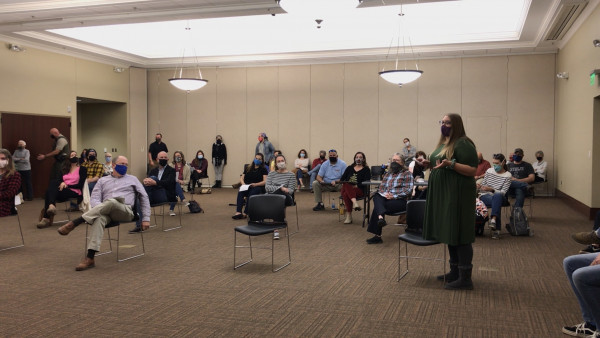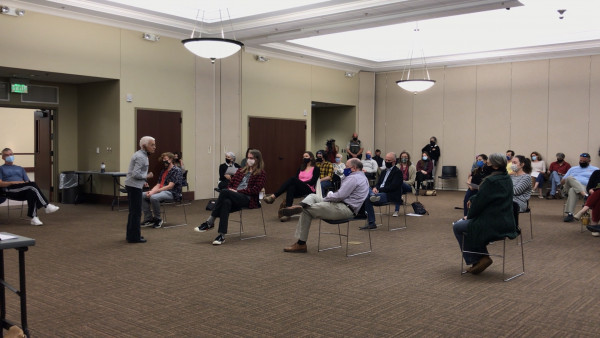Back to the shelves

Leader photos by CALEB DANIEL
Attendees filled the Lincoln Parish Library’s Events Center Wednesday as the library’s Board of Control met to discuss the recent decision to remove several LGBTQ books from the children’s department and make them available by adult request only. The board reversed that decision Wednesday. Pictured are attendees Claire Roan (above) and Rose Daigle (below) giving public comment at the meeting.

The LGBTQ kids’ books that were recently restricted to adult request only at the Lincoln Parish Library will go back on the children’s department shelves, the library’s Board of Control ruled Wednesday.
Before a full crowd at the Lincoln Parish Library Events Center, the board voted to return all the books in question to their original locations and slightly tweak its policy on unattended children to make it even more clear that moderation of a child’s reading is parents’ responsibility, not the library’s.
At least 50 people were in attendance, and about 24 of them gave public comments before the board’s vote. The comment time alone took up more than the first hour of the meeting.
Background
Board member Deborah Hollimon told attendees Wednesday the board had been “shocked” and “caught flat-footed” when in November they began receiving what she described as “a barrage of copied and pasted emails from concerned Christian homeschooling and parent groups” concerned particularly about two books: “George” and “Rick” by Alex Gino.
“Before we could even read them, we got another drove of letters saying, ‘Also we’d like you to remove the following seven books,’” Hollimon said.
“At this point we were like, “Whoa, what’s going on?’... It wasn’t like we’re trying to ban a bunch of books. No, we were just trying to educate ourselves.”
Fewer than a quorum of board members met twice in mid-November and instructed Library Director Vivian McCain to remove all the books mentioned in the letters and make them available for checkout by adult request only.
Every removed book featured LGBTQ (lesbian, gay, bisexual, transgender and queer) characters or content, to varying degrees.
The vote
Hollimon read to attendees a statement against censorship that the Louisiana Library Association released in response to the situation in Lincoln Parish.
She also read from the library’s own material selection policy, which states “the library does not stand in the place of parents” concerning what material a child should read.
Following those statements, the board voted to return the books to the shelves and add a line from the materials policy to the library’s existing unattended children policy as well.
Each board member in attendance voted in favor of the motion, except Amy Miller who abstained from voting because she had only been appointed to the board the day before the vote. Member Charles Penuell was absent.
The public speaks
Some attendees spoke against the books being in the children’s department, particularly the original two books that were first removed. About twice as many people spoke in favor of putting the books back on the shelves. A few spoke on other issues, such as the library’s budget and its millage renewal that failed at the polls Saturday.
“As a taxpayer, I feel it is the library’s job to provide a diverse range of materials for the community, of all walks of life,” attendee Susan Campbell said. “And it is the parents’ job… when we’re talking about young children’s books, (parents) should be with a child anyway.”
Robyn Smith said she wrote one of the original complaint letters to the library. She said her problem was only with “George” and “Rick” and not because of their LGBTQ content, but rather what she described as their sexual content in general.
She said while “George” may not directly depict pornography, it contains references to fourth-grade characters looking at “dirty magazines or porn.”
“Is this sexually graphic content?” she said. “Maybe not, but it is sexual content… I would have the same opinion if all the characters in the book were heterosexual.”
A copy of one of the complaint letters previously obtained by the Leader, which McCain said shared the same wording as many others, expressly identified “LGBTQ items” as the cause for concern.
Smith said she personally did not complain about any of the more than a dozen other books that had also been pulled and did not know what caused them to be pulled as well.
In the original story on Dec. 4, the Leader cited McCain saying none of the books in question were sexual in nature. The Leader also went to the library twice and perused all the books on the reserve shelf, but both times “George” and “Rick” were checked out and not available.
Another concerned parent mentioned that “George” and “Rick” were at one point seen “front and center” in the children’s department display area. McCain denied that library staff had ever put those books on display.
Claire Roan, a self-described librarian of 10 years in other systems, said censorship goes beyond complete removal of materials.
“Censorship is suppression, not just removal,” she said. “If you make it harder for people to get those books, it is censorship.”
Several attendees gave personal testimonies, either from themselves or people they know, who wished they had more access to LGBTQ-positive materials as a child. At one point a speaker went past the time allotted by the board, only for the next speaker to pick up and finish reading the written statement of the one before her.
Some speakers attempted to give middleground suggestions, such as creating an extra section between the children’s and teen’s sections. Some mentioned ratings systems like those used by the Motion Picture Association of America.
The American Library Association specifically states on its website that public libraries cannot enforce such systems, including “procedures that effectively deny minors equal and equitable access to library resources and services available to other users.”
The policy
The library’s unattended children policy was adopted by the board in August in response to several situations in which young children were left alone at the library, sometimes all day.
On Wednesday, the board added the following statement to the policy, lifted straight from its existing material selection policy:
“Only parents and guardians have the right and responsibility to guide and direct the reading, listening, and viewing choices of their own minor children. The Library does not stand in the place of parents. (in loco parentis)”
The existing policy requires parents to stay in the same area of the library as their children age five and under. Parents must stay in the building with a child age six through 11 at all times. Children between 12 and 17 should not be left alone in the building for “lengthy periods of time.”
After all the public comments were made, board Chair Augusta Clark told attendees she was encouraged by the feedback and hopes the board can continue to foster community engagement in other areas.
“This is going to be the beginning of what we term as a necessary thing, to have the kinds of forums we’re having, so that we can hear you, and you can hear us,” she said.

